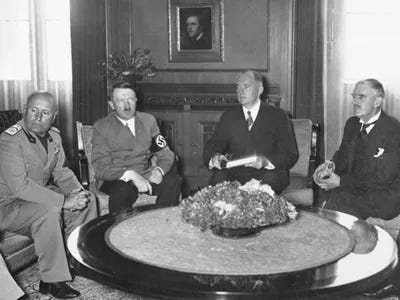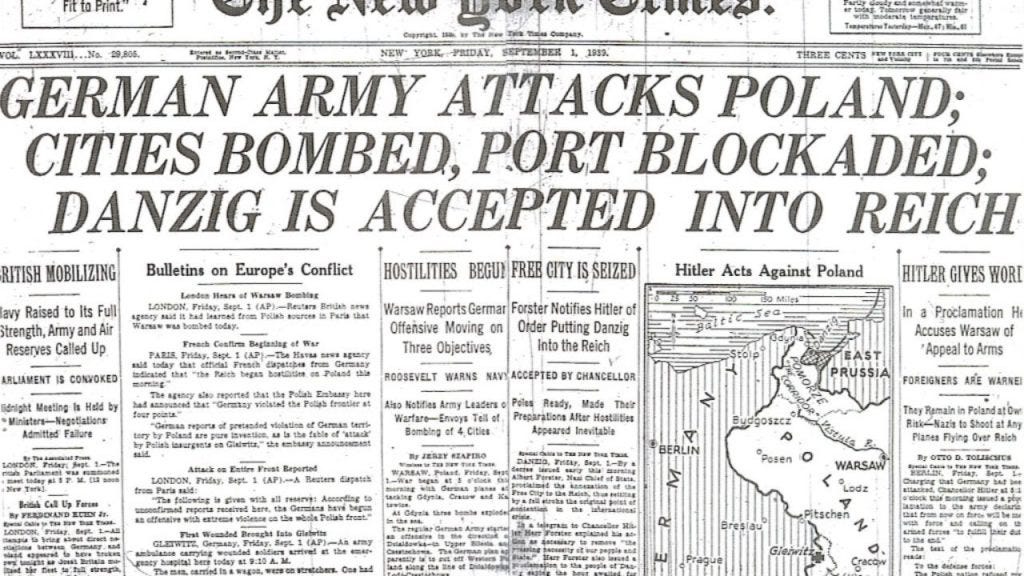At 4:45 a.m on September 1, 1939, German Dictator Adolf Hitler ordered his land, air, and naval forces to attack Poland, a decisive move that led to World War II, a conflict that would leave nearly 60 million people dead worldwide—including 10 million Jews and Gypsies who perished during the Holocaust.
German soldiers marched into Poland 85 years ago this week…
For the prior year and a half, the world had been on war watch; Hitler, seeking “lebensraum,” or “living space” for Germans, had already ordered the successful “anschluss” (annexation) of German speaking Austria in March of 1938. Hitler would annex the Sudetenland—and eventually the whole of Czechoslovakia—by that summer. Following this last event, war was averted by the September 1938 Munich Peace Treaty in which Hitler promised no further aggression, a promise that prompted then British Prime Minister Neville Chamberlain’s infamous declaration that he had helped achieve “peace for our time.”
From left: Italian Dictator Benito Mussolini, Hitler, Joachim Von Ribbentrop, and British Prime Minister Neville Chamberlain during the Munich Peace Conference one year before Germany invaded Poland…
That peace was tenuous at best; on August 23, 1939, Hitler and Soviet Dictator Josef Stalin, by and through their respective Foreign Ministers Joachim Von Ribbentrop and Vyacheslav Molotov, signed a non-aggression pact in which they agreed to divide Poland between their two nations. This move assured that Hitler would not have to face an eastern front if Great Britain and France followed through on their assurances that they would declare war on Germany if it invaded Poland.
Equally crucial was the economic pact that the two nations signed in which the Soviets promised to supply food and oil to the Germans, a move that would allow Hitler to ride out any blockade that Great Britain’s vastly superior Royal Navy might pursue to cut off supplies and subsistence.
Two weeks after the German-Soviet pacts were signed, on September 1st, after German SS officers faked a Polish invasion by donning Polish Army uniforms (and leaving deceased concentration camp inmates adorned in both German and Polish uniforms as proof of a skirmish), Hitler unleashed his first “blitzkrieg” or “lightning war,” which was a highly coordinated series of air and land strikes that was so devastating that within one week, the Germans had cleared 140 miles and were on the outskirts of Poland’s capital city of Warsaw.
For reasons that remain unknown, despite declaring war on Germany on September 3rd, neither Chamberlain’s British Royal Air Forces, nor France’s vast army under the authority of Premier Edouard Daladier, attacked Germany from its vulnerable western border along the Rhine. Such an attack not only could have saved Poland—but it arguably could have stopped World War II before it truly began.
German air forces reduced much of Warsaw, Poland to rubble in September of 1939…
But the war did begin! By its end, two allies, the United States and the Soviet Union, would soon become the world’s major military superpowers and bitter ideological foes in a “Cold War,” one in which the proliferation of nuclear weapons among both nations (and their closest allies) continues to vex the modern world with fear that a third World War, should one ever break out, will usher in a fiery nuclear Armageddon.
Lest we forget…








Lest we forget!! ✨
Excellent work as always. Past being prologue, I wish more Americans were historically literate (or just more literate generally). I will point out that many Roma consider "gypsy" a slur and was surprised to find its use in your introduction.